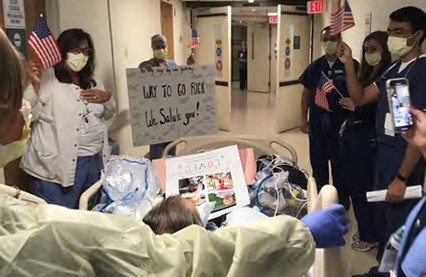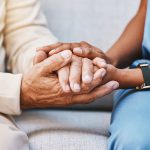Chelsea and her father, Rick, had always been close, talking a few times a week despite Chelsea being at home in Portland, Oregon, and Rick traveling frequently. Early on, his travel was a requirement for his military career as Navy SEAL. Later, it was a sense of duty as a caregiver for his father, who lived across the country in Uniontown, Pennsylvania.
Chelsea spoke with Rick on March 25, the day after his father’s funeral. Rick, who lives in Coronado, California, was in Uniontown at the time, juggling duties as son, caregiver and executor of his father’s estate.
A few days later, Rick was admitted to the hospital with COVID-19. Soon after, he was intubated and moved to intensive care. Although the odds were long, his best chance of survival would be a transfer to UPMC Presbyterian.
The Long Odds
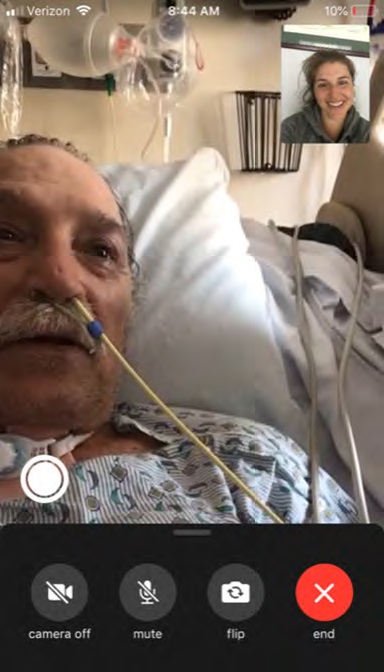
Chelsea and Rick FaceTime during his COVID-19 treatment at UPMC.
The helicopter arrived at UPMC Presbyterian on a Friday night, and he remained in the ICU for 82 days. Dr. Ian Barbash, associate medical director of the UPMC Presbyterian Medical Intensive Care Unit (MICU), was the attending physician.
“He was the sickest patient in our ICU that day,” Barbash recalls.
MICU nurse Dana Romah remembers that their early goal was simply getting him stable enough for a tracheostomy.
“I called Chelsea, and I told her that I didn’t know if he would survive,” Barbash said of the first of many calls with Rick’s family. “I told her that if I was a betting man, I wouldn’t actually bet on him surviving, but we would do everything that we could to help him get better.”
Chelsea vividly remembers that conversation as a reality check. “I appreciated his honesty,” she says. “I needed to hear [the odds of survival] so I could start the grieving process and start realizing that it was up to me to maintain hope — that it was on me to cultivate hope for my dad and our family.”
Coordinated Command
Chelsea was frequently on the phone with her father’s nurses, doctors and the MICU staff and often coordinated FaceTime calls with family and friends. While Rick’s condition was such that there was no good news to share for the first six or seven weeks, Chelsea always conveyed gratitude while maintaining optimism.
The team answered Chelsea’s thorough questions and also took time to ask Chelsea, who was pregnant with her first child, how she was doing as she navigated her father’s life-or-death condition.
Finding a Rhythm
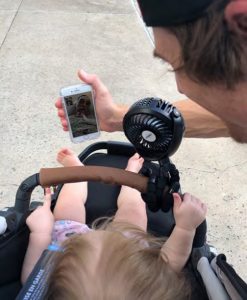
Rick FaceTimes with his granddaughter while undergoing COVID-19 treatment.
The familiarity Chelsea gained with the care team helped build trust and calmed fears.
“I will forever look at people in the medical world differently because of what they’ve done for my family and my dad,” Chelsea says.
Sometimes during Chelsea’s frequent conversations with her father’s care team, she could sense by their tone that someone else they were caring for wasn’t doing well.
“We would say our prayers all the time for the other patients because at least we were still in the fight,” Chelsea says. “That’s often times the metaphor our family used — the doctors, nurses and staff were right there on the frontlines, having to be brave every single moment to continue to fight and be their patients’ advocate when all these patients and their families are absent.”
Continuing the Fight
It was through Chelsea’s near-constant communication with Romah that she learned of the innovations taking place to wean Rick off the ventilator.
Romah also shared how Rick was able to increase his mobility using the MOTOmed — a hand bike and foot bike that allowed him to exercise while he was still testing COVID-19 positive, which meant physical and occupational therapists couldn’t come into his room.
“It reminded me time and time again that he was in the best hands,” Chelsea says. “He was in the best possible place he could be to get the best care, and whatever the outcome, at least we wouldn’t be questioning that.”
Rick doesn’t have many memories between being admitted to the hospital in April and late June, when his delirium and sedation were resolving in the MICU. Weeks felt like hours or days, but for his family, weeks felt like months.
Rick was impressed by what he calls the “battle rhythm” of the unit — the coordination, the long hours, and the keen attention to detail he observed as a patient.
Moving On
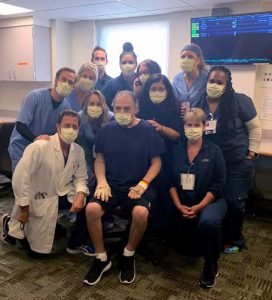
Rick visits the UPMC Presbyterian MICU team before his discharge from UPMC Mercy.
When Rick moved to the stepdown unit at UPMC Presbyterian, the MICU staff sent him off with a patriotic parade and presented him with a placard signed by 101 team members — a gesture befitting a man who valiantly served his country and who battled the largely unknown enemy of COVID-19.
Rick was then transferred to inpatient rehabilitation at UPMC Mercy. Each step forward came with the help of UPMC nurses, physicians, occupational therapists, physical therapists and respiratory therapists.
After spending 127 days at UPMC, Rick went back to UPMC Presbyterian to thank his ICU crew in person the day before he was discharged from UPMC Mercy.
Rick wanted to show his progress and share a message with all who were involved in his care. “Number one — thank you,” he told them. “Now I understand — because I didn’t before — the demand of the job. We need you. Keep doing what you’re doing because you’re saving lives. I’m living proof of that.”
The Road Ahead
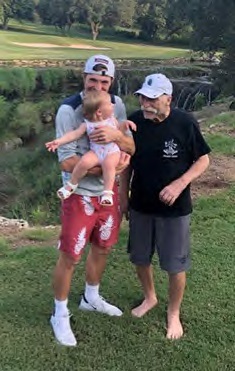
Rick spends time with his family in Texas following his treatment at UPMC.
After leaving UPMC Presbyterian, Rick set off for Austin, Texas, where he would spend time with his son and family— including his granddaughter, Addison.
He’ll return home to California once his lungs have further recovered from COVID-19. The virus caused damage that leaves Rick unable to fly or travel through the higher altitude mountain ranges that a road trip home would require.
An avid fisher, hunter and all-around outdoorsman, Rick looks forward to regaining more feeling and use of his hands so that he can be independent, though he knows it will take time. When he’s fully recovered, he plans a return trip to Pittsburgh and UPMC.
Long after last caring for Rick in the ICU, Barbash still checks in with Rick and his family from time to time. “To put it simply, this is why we do our job,” Barbash says. “I’m so grateful to have been wrong about his prognosis.”


